MARKET OVERVIEW
The global agile transformation services market is a part of the larger business and technology consulting services sector, one that is dedicated to helping organizations implement and grow agile practices across different departments and models. This market is not just in place to bring agile practices to a company but to assist businesses with integrating them deeply into their culture, processes, and decision-making. Agile transformation is not a generic process but necessitates a very bespoke approach based on the size, industry, and maturity of a company. The need for such services has over time moved from simple agile coaching to enterprise-wide transformations, necessitated by the requirement to speed up delivery cycles, promote cross-functional teamwork, and enhance adaptive planning capacity. At its essence, this market will not only provide consulting strategies but propel end-to-end transformations throughout complex business landscapes. Service providers in the global agile transformation services market will provide deep guidance, not only to software teams but extending to finance, marketing, human resources, and other historically non-agile departments. As businesses become increasingly digitally driven, agile transformation will be a base for riding change, not merely responding to it.
What distinguishes this market is its forward focus. Organizations will increasingly rely on agile transformation services not just to address immediate requirements but to establish capacity for ongoing change. In reality, this will involve assisting leadership teams in crafting adaptive cultures, reimagining governance models, and revisiting customer engagement approaches. Far from employing agile frameworks as Band-Aids, service providers will seek to bring about enduring behavioral and structural change.
The global agile transformation services market will not only be concerned with employee training or the implementation of agile tools. Rather, it will require challenging assumptions on productivity, hierarchy, and control. It will compel organizations to rethink how decisions are made and how value is measured. Therefore, successful service providers will place emphasis on collaboration with internal stakeholders, reframing approaches to suit the context of each organization in a non-framework way. Here, success will not be measured by the quantity of agile teams a business possesses, but by how successful it has been at making a shift in its mindset and working model to facilitate agile thinking at scale.
It is not unexpected that businesses that are going through agile transformation will experience pushback, and overcoming this pushback will make up a key part of the services provided. Psychological safety, open communication, and leadership alignment will be top areas of attention during transformation initiatives. In the future, the global agile transformation services market will continue to grow as more companies grapple with the constraints of legacy systems. Organizations will look for not just external advice but also long-term collaborations with transformation leaders who can guide, mentor, and grow with them.
Global agile transformation services market is estimated to reach $116,219.95 Million by 2032; growing at a CAGR of 18.2% from 2025 to 2032.
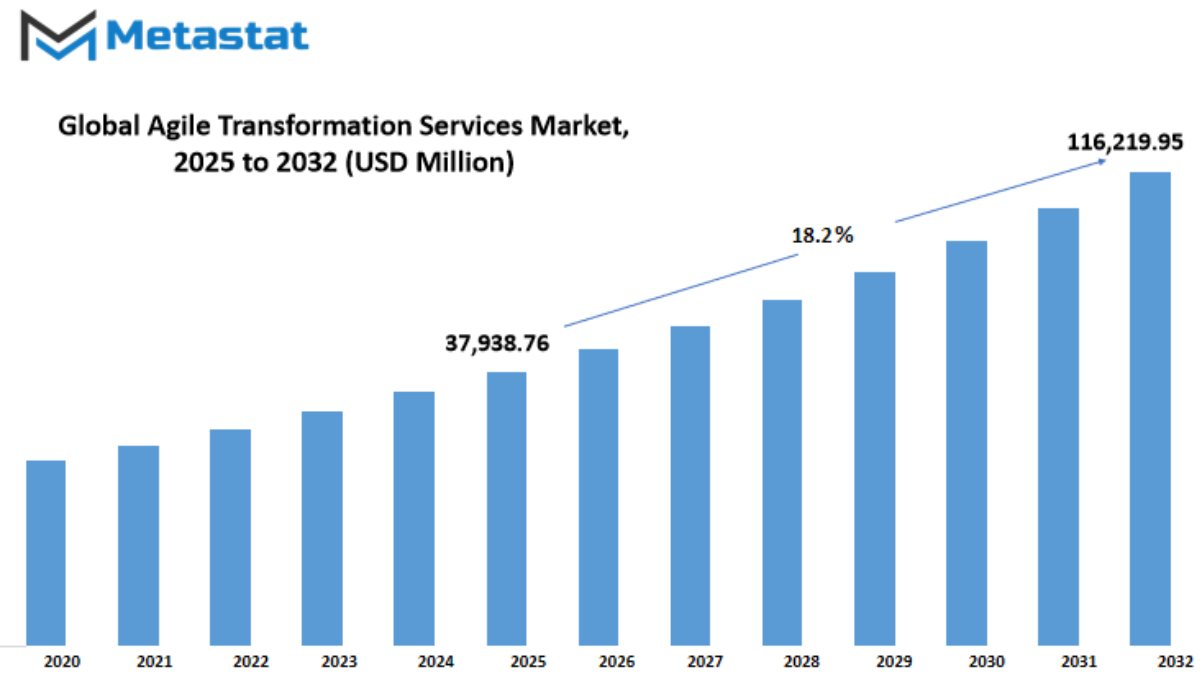
GROWTH FACTORS
The global agile transformation services market is projected to increase steadily over the next few years, primarily due to more businesses wishing to enhance the way they work and produce improved outcomes more quickly. Companies today are increasingly realizing that conventional work methods may be unproductive and slow. Therefore, companies are adopting agile principles that allow greater flexibility, quicker decision-making, and more effective teamwork. The need for professional assistance in implementing this transition is growing, which is why the market will most probably grow. The companies require not only aid in employing agile software but also in transforming their culture, educating their staff, and shifting their practices. These requirements are among the main drivers of the market.
New technology and software are emerging to facilitate agile methods of working, ensuring it is simpler for businesses to implement these changes. Increased remote work has also made agile transformation more imperative, as teams require better means of staying connected and keeping projects afoot even if they're not in the same location. Service providers that are able to provide tailored support stand the chance of performing well since various firms have varying requirements in the implementation of agile practices. Still, there could be some issues that slow down the growth of the market.
Even if leadership is willing to transition towards agile practices, some workers might be comfortable with the old system, and it would be difficult to change. Another hindrance is that there are no skilled professionals who know agile methods properly. With proper people to lead and support the transformation, some organizations would not be able to achieve it.
In spite of all these challenges, the future is brighter. The ongoing increase in digital transformation initiatives across industries would offer profitable opportunities for the market in the future years. With increasing businesses depending on digital tools and information to manage their organizations, the demand for agile services will grow.
The global agile transformation services market would not only assist enterprises in staying current with change but also drive it. Firms that adopt this transition early enough are better placed to remain competitive and address customer needs more efficiently. Organizations can achieve maximum benefits from agility and build sustainable value with the appropriate support and guidance.
MARKET SEGMENTATION
By Service Type
The global agile transformation services market is likely to grow steadily over the next few years as more organizations seek flexible means of responding to change. Organizations will continue to move away from conventional forms and turn towards agile approaches in order to remain competitive. The shift will be necessitated by the urgency of enhancing how groups collaborate, produce products quicker, and respond better to their customers' needs. As this market expands, it will generate increasing demand for services facilitating companies to bring this transition smoothly and permanently. Divided by service type, the market is segmented into Agile Consulting, Agile Development, Agile Training and Coaching, and others.
Agile consulting will be instrumental in leading the companies through the process of change. These services assist in determining what needs to change and how to implement that change. They provide definitive steps and assist in preventing errors that would hold everything back. As companies continue to advance, consultants will assist in making decisions based on actual outcomes and create a culture of change in the long run. Agile development is also a crucial component. This service is all about developing and refining products in a manner that reacts to feedback rapidly.
More teams in the future will apply agile development to test concepts quickly and shift according to what they discover. This will assist companies in saving money and time, and not getting too far down the wrong path. Agile development will keep on expanding as businesses appreciate the importance of quick, small changes compared to slow, large ones. Instruction and guidance will be equally significant. Simply adopting new techniques isn't enough individuals need to know how to implement them effectively. Agile training and coaching offerings will assist teams and leaders in developing the correct habits and culture.
This will keep change lasting longer and cut down on the likelihood of returning to previous ways. These services will keep growing as more companies realize that true change begins with individuals, not with systems. Other services will also increase to meet the unique needs of various companies. Whether it is tools, assistance, or tailored assistance, these services will assist businesses in honing their strategy. The global agile transformation services market will continue to expand as more sectors hop on the bandwagon. In the future, this change will define the way business operates, thinks, and expands positioning agility as an essential component of success.
By Methodology
The global agile transformation services market is gradually expanding as organizations shift away from conventional techniques to adopt accommodating modes of handling projects and teams. This is being fueled by the urgency to respond promptly to customer needs and altered market conditions. Companies are catching on to the fact that inflexible structures are unable to cope with high-speed environments, and that's where Agile practices provide true value. Looking forward, the global agile transformation services market will have a central role to play in how firms define their future business, especially through the manner in which they select and implement various Agile approaches. One of the fundamental factors defining this transition is the approach by which each firm selects to meet its individual demands.
Scrum is still the popular choice because it breaks up work into scheduled intervals called sprints, enabling groups to concentrate and progress steadily. Scrum/XP that combines Scrum and Extreme Programming is also in the spotlight as it unites planning with technical prowess. For companies that would like a transition that is less jolting, Scrumban provides a hybrid of Scrum and Kanban, enabling them to plan but remain responsive. Kanban itself appeals to companies that want to visualize their workflow and limit ongoing tasks to increase productivity. Then there are Custom Hybrid models, tailored to a company’s unique goals and setup. These are becoming more common, especially among firms that want to blend several methods to create something that works best for their culture. There are other approaches as well and they are employed when none of the usual ones perfectly suit the working method of the organization.
In the years to come, their demand will rise as companies keep changing towards Agile not only for software development but also in different departments such as marketing, operations, and even finance. As more teams embrace Agile mindset, businesses will increasingly turn to these services to navigate them through each phase from training and coaching to implementation of tools and leadership guidance.
The global agile transformation services market will also be influenced by technology advancements, with AI and automation technologies set to have an increased role to play in the way teams plan and deliver work. This shift will compel service providers to deliver more sophisticated support, not only in the implementation of Agile practices but in assisting companies in refining those practices over a period of time. This gradual drift towards speed and flexibility indicates how the global agile transformation services market will remain crucial in enabling businesses to grow and adapt to emerging challenges.
By Organization Size
The global agile transformation services market is expanding at a steady pace since more companies seek improved means to fit into changing circumstances and fulfill customer needs sooner. This is not a fleeting trend. It indicates a profound shift in how organizations work and think. In the future, Agile practices will become an integral aspect of organizations of all shapes and sizes, not solely a technical team tool. Faster delivery, improved collaboration, and continuous improvement are one of the main drivers to bring about this shift across all departments.
When looking at the market by organization size, the needs of large enterprises and small and medium enterprises (SMEs) are clearly different, but both are moving toward Agile practices. Large enterprises often have more complex structures, which can slow down decision-making and innovation. For them, adopting Agile helps create smaller, cross-functional teams that are more flexible and better able to handle changing priorities.
These firms will keep making investments in Agile coaches, learning, and digital solutions that enable a more nimble manner of working in the future. They will also apply Agile across departments beyond technology, such as marketing, finance, and operations. Smaller businesses, on the other hand, typically have less complex structures and fewer bureaucratic layers.
This enables them to transition to Agile practices rapidly. Although they won't have the same resources as large organizations, they tend to be more agile and accepting of change. In the coming years, the need for economical and scalable Agile solutions that cater to smaller companies will continue to increase. Those solutions will be built around rapid implementation, easy-to-use platforms, and simple access to expert advice. Gazing into the future, the global agile transformation services market will be defined by technology, customer behavior, and worker expectations. Organizations will not merely desire to implement Agile they will need to maintain it.
This is about prioritizing long-term cultural transformation, ongoing learning, and leadership endorsement. With more businesses operating in global economies, being able to react rapidly will be more crucial than ever before. Agile methodologies provide a way to accomplish that, and service providers in this area will keep expanding their services to assist businesses of all sizes. Large businesses and SMEs alike will contribute to this expansion, each in their own manner driving the marketplace further.
By Industry Vertical
The global agile transformation services market is expanding gradually, with industries increasingly understanding the importance of being responsive and adaptable to change. This market is not merely about embracing new styles of working; it is about creating a mindset within organizations where collaboration, timely decision-making, and customer satisfaction take center stage.
Looking forward, various industry verticals are defining how this market is evolving, and each of them has their own requirements and challenges. Those variations are compelling service providers to develop more customized methods of attack that can accomplish particular objectives and function in specific business environments. Within the banking, financial services, and insurance (BFSI) industry, a strong urge exists for quicker digital services and enhanced customer experiences.
With compliance and security being huge issues, agile methodologies assist teams in responding rapidly to changing regulations and client needs. The IT and telecom industries, however, are moved by relentless innovation. They tend to embrace Agile principles first and also lead the charge for more evolved frameworks that can manage sophisticated projects without hindering productivity. Retail is racing rapidly in the direction of more personalized customer experiences, and Agile assists teams in this space to experiment and deploy new concepts fast.
In media and entertainment, where consumption patterns in content shift fast, Agile methodologies enable organizations to stay one step ahead by getting new features and content to market faster.
Government and public sector institutions, which have traditionally been behind in terms of change, are now starting to embrace Agile as a way of enhancing public services and reacting more effectively to citizen needs. Manufacturing is also starting to depend on Agile principles to meet global demand and the movement toward smart factories. Teams are applying Agile to reduce development timelines and enhance product quality.
Healthcare providers can introduce new systems and react to policy or patient change with increased velocity through Agile approaches. Hospitality is employing Agile to improve guest experiences and optimize operations. Other sectors, from logistics to education, are also starting to apply the advantages of Agile change. In the years to come, the global agile transformation services market will grow as businesses look for means to remain relevant and effective. Agile will no longer be a trend but a fundamental aspect of organizational thought and doing business. Demand for these services is bound to increase as more industries discover the long-term benefits of being genuinely adaptive.
|
Forecast Period |
2025-2032 |
|
Market Size in 2025 |
$37,938.76 million |
|
Market Size by 2032 |
$116,219.95 Million |
|
Growth Rate from 2025 to 2032 |
18.2% |
|
Base Year |
2024 |
|
Regions Covered |
North America, Europe, Asia-Pacific Green, South America, Middle East & Africa |
REGIONAL ANALYSIS
The global agile transformation services market is witnessing steady growth across various regions, each showing unique potential for expansion based on local demands, technological development, and enterprise needs. When we look at this market from a geographic point of view, the global spread offers insight into how different areas are approaching agile methods to improve business outcomes. North America, which includes the U.S., Canada, and Mexico, has been one of the earliest adopters of agile transformation services. This region will likely continue leading due to its strong tech presence, mature IT infrastructure, and ongoing investment in digital modernization. Companies in the U.S. are especially known for pushing agile adoption not only in IT but across entire organizations, which gives the region an edge in setting future trends.
In Europe, nations like the UK, Germany, France, and Italy are showing strong interest in using agile to increase efficiency and customer satisfaction. While the adoption may not be as fast-paced as in North America, it will still grow steadily. Organizations across Europe are focusing on how agile can help them adjust to rapid changes in consumer behavior and market conditions. They are also working on improving their internal workflows and cross-team collaboration, which makes agile an ideal fit.
Asia-Pacific, including India, China, Japan, South Korea, and others, is becoming a major contributor to the global agile transformation services market. This region is expected to see the highest growth in the coming years. With a large number of startups and digital-first companies, Asia-Pacific countries are in a good position to adopt agile methods quickly. India and China especially are home to many tech-driven businesses that will rely more on agile frameworks to stay ahead in the competition.
South America, with countries like Brazil and Argentina, is growing at a slower but steady rate. Businesses here are becoming more aware of the benefits of agile and how it can support project delivery and adaptability. Meanwhile, in the Middle East & Africa, including GCC Countries, Egypt, and South Africa, the market is still at a developing stage. However, with increasing investment in technology and infrastructure, this region will likely catch up over time.
As companies around the world focus on being more flexible and fast in responding to change, the regional progress of the global agile transformation services market will continue shaping how businesses work in the future.

COMPETITIVE PLAYERS
The global agile transformation services market is expected to experience significant change as organizations continue to adopt flexible approaches to work, collaboration, and product development. This shift is not just about following a trend it reflects a deeper change in how businesses are thinking about productivity, adaptability, and staying ahead in a fast-paced environment. Many companies across industries are now rethinking their strategies and moving towards agile frameworks to meet rising customer demands and to deal with constant market changes more effectively. This change is helping them become more responsive and customer-focused, two things that are becoming more critical in today’s competitive world.
In the years to come, the global agile transformation services market will likely see strong competition among key players who bring different strengths and solutions to the table. Companies like Scrum Inc, Accenture plc, and Deloitte are already making an impact by offering strategies and support that help businesses shift smoothly to agile methods. Other firms such as Apptio, Broadcom Incorporated, and CGI Inc are playing their part in providing digital tools and systems that back up this transformation. Smaller but highly specialized companies like AgileLAB GmbH, ELEKS, and Softnotions Technologies Pvt Ltd are also offering unique solutions tailored to the specific needs of organizations. Each of these companies has its own way of helping clients become more efficient, flexible, and aligned with modern business expectations.
Moving forward, competition in this market will become more focused on innovation, speed, and the ability to deliver measurable results. Clients will not just look for guidance; they will want proof that these transformations actually improve performance. As the demand grows, so will the pressure on service providers to personalize their offerings and show clear value. The future will likely see deeper use of technology, data-driven decision making, and greater collaboration across teams and locations. Companies like TEKsystems, Virtusa Corp., Nagarro, Bain & Company, Inc., and Cigniti Technologies are expected to continue leading the way, but there will always be room for emerging players with fresh approaches.
Ultimately, the global agile transformation services market will continue to grow and shift as organizations keep looking for better ways to work and compete. The companies that can adapt, deliver real outcomes, and stay connected to the needs of their clients will shape the future of this market.
Agile Transformation Services Market Key Segments:
By Service Type
- Agile Consulting
- Agile Development
- Agile Training and Coaching
- Other
By Methodology
- Scrum
- Scrum/XP
- Scrumban
- Kanban
- Custom Hybrid
- Other
By Organization Size
- Large Enterprises
- Small and Medium Enterprises (SMEs)
By Industry Vertical
- BFSI
- IT and Telecom
- Retail
- Media and Entertainment
- Government and Public Sector
- Manufacturing
- Healthcare
- Hospitality
- Other
Key Global Agile Transformation Services Industry Players
- Scrum Inc
- Accenture plc
- Deloitte
- Apptio
- Broadcom Incorporated
- CGI Inc
- Cigniti Technologies (A Coforge Company)
- TEKsystems, Inc.
- Xebia
- Bain & Company, Inc.
- Virtusa Corp.
- Nagarro
- MSH
- ELEKS
- AgileLAB GmbH
- Softnotions Technologies Pvt Ltd
- Kenway
WHAT REPORT PROVIDES
- Full in-depth analysis of the parent Industry
- Important changes in market and its dynamics
- Segmentation details of the market
- Former, on-going, and projected market analysis in terms of volume and value
- Assessment of niche industry developments
- Market share analysis
- Key strategies of major players
- Emerging segments and regional growth potential



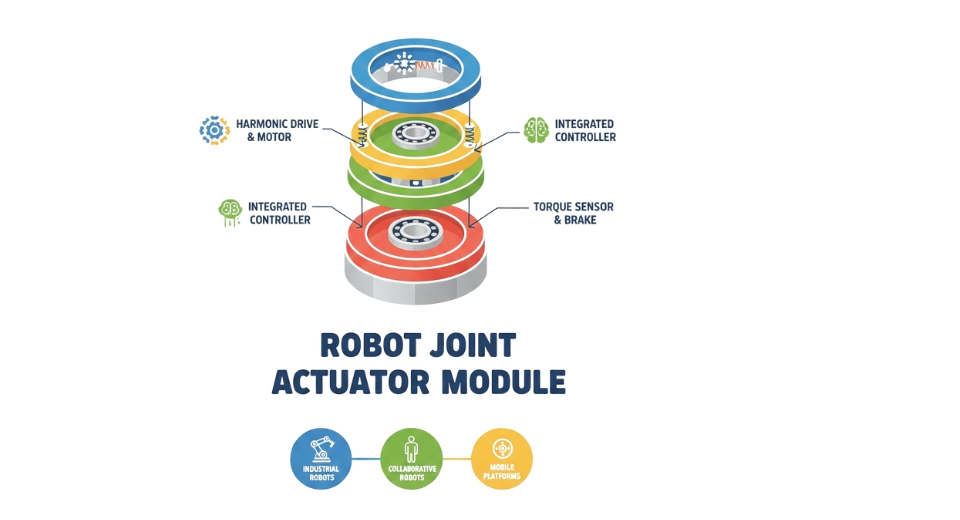
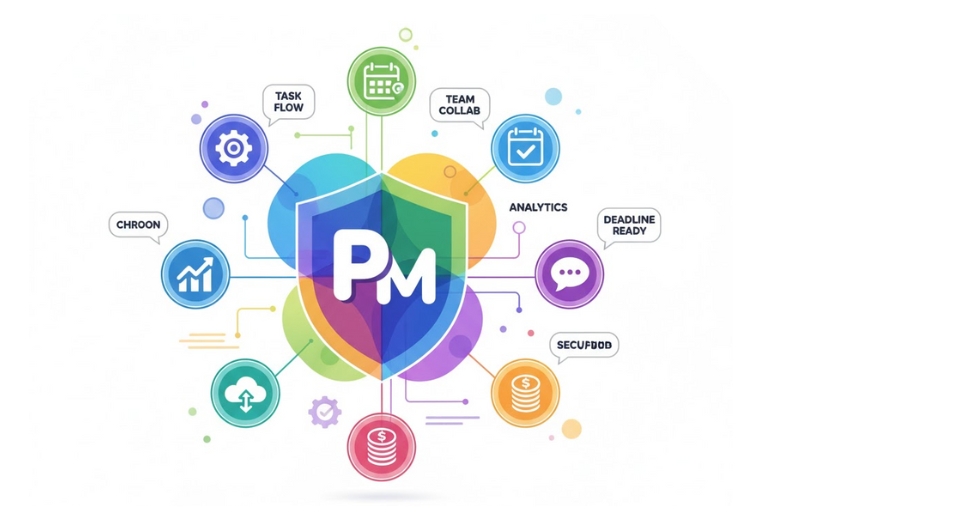
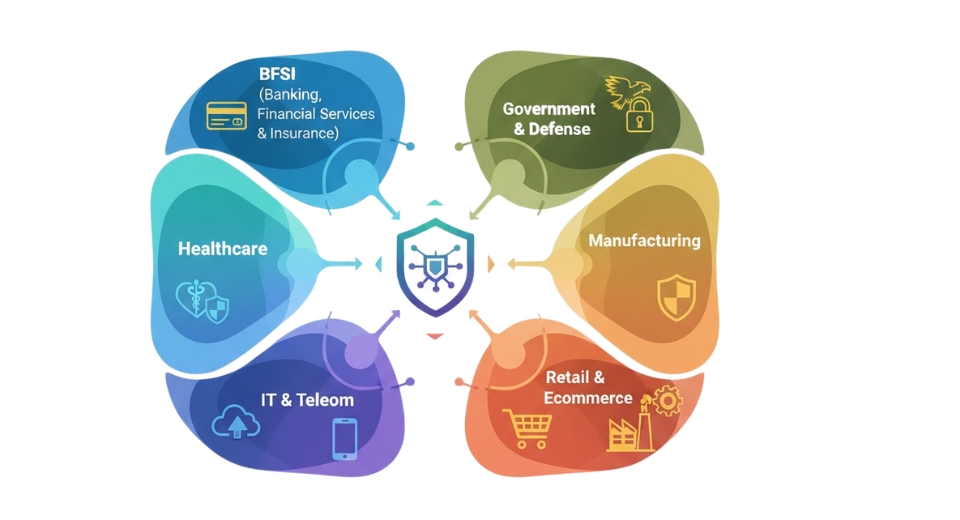
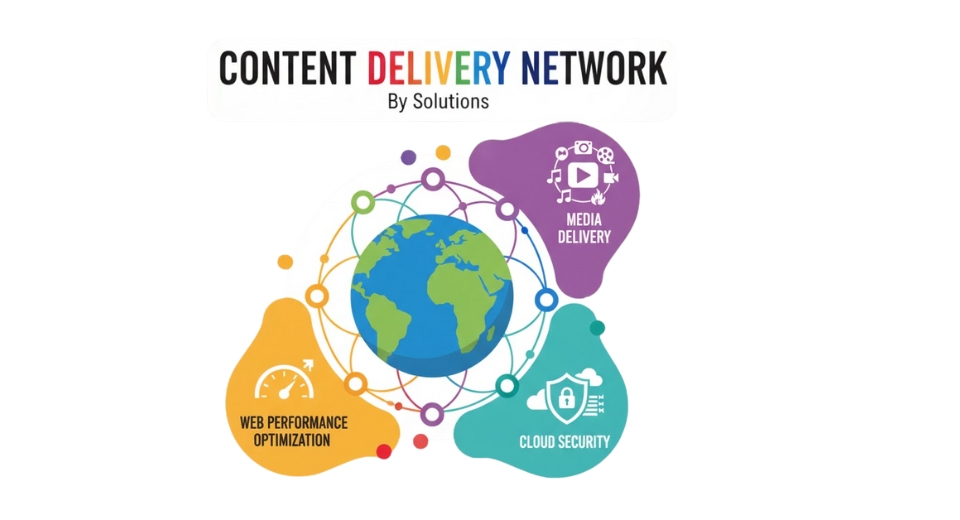

 US: +1 3023308252
US: +1 3023308252






